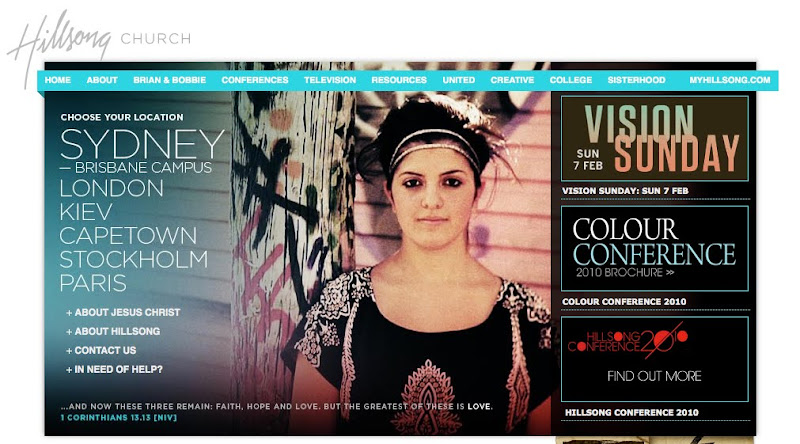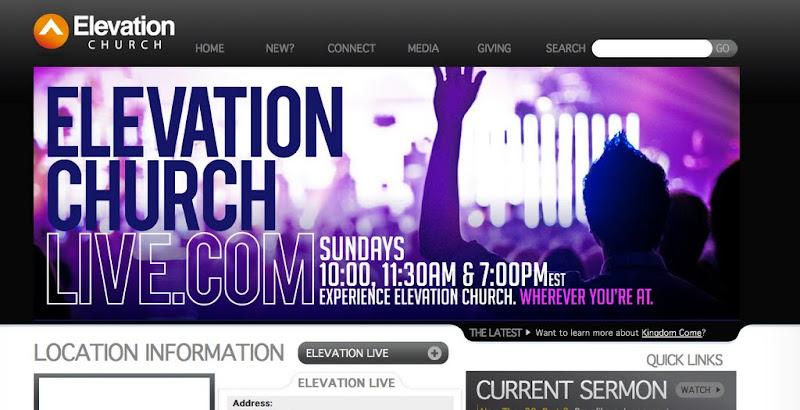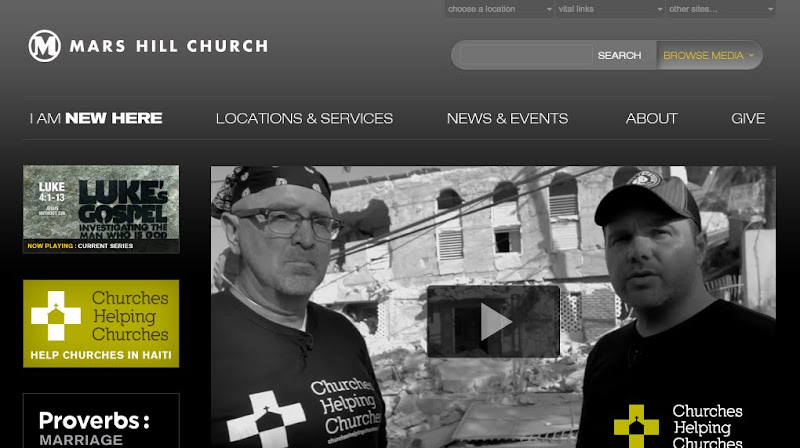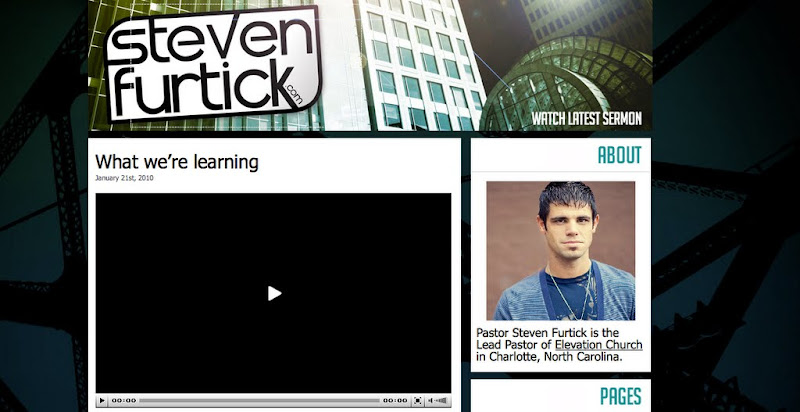I’m not sure who to address this open letter to. Open letters, as a medium, allow opinions to be voiced from an individual for the people addressed, but the point of the genre is that it provides some sort of benefit for the “public” – the reader, as well as the addressee.
I thought about making this an open letter to Hillsong. But who am I to tell another church how to do their business. I’m barely out of nappies as far as this ministry caper is concerned. So I decided I’d try addressing the people we have in common – the people who live around us.
There will be people who say I should’ve sent this straight to Hillsong, without making it open. And I would’ve, but I can’t for the life of me figure out how to contact the relevant people at Hillsong. They’re not exactly transparent on that front. I will tweet them. It is also hard to provide criticism on the basis of “thought” when the well on that front has been poisoned in the sermon. More than once. Apparently trusting God’s word means not really grappling with it all that hard, unless you’re one of the few who can “rightly divide” it (2 Tim 2:15). So much for the priesthood of all believers. I’m also pretty sure that the people who watched our little group at Hillsong assumed we weren’t being moved by the Spirit, because we weren’t moving with the crowd. We weren’t responding to the talk the way we were called to. So I felt uncomfortable talking about the talk with anybody there tonight.
But I want to assure you, if you’re from Hillsong, that I, with meagre powers, love Jesus. He has captured my heart, and my head. And I offer this humbly as a suggestion that something was missing from Hillsong tonight. Something pretty big. Essential even.
Dear Brisbane,
I’m not an expert on Hillsong, or what goes on there. I’ve been once. Once was enough.
I’m not the emotional type. I’m, I hope, a relatively typical Aussie bloke. But I do go to church. Lots. I work for a church as a student, I’m training to be a minister. A few weeks back, when I was going through a pre-delivery critique of one of my sermons, someone suggested it lacked a little passion. I wondered a bit about whether or not I’m passionate enough about the gospel. I wondered whether I really do get excited about the cross. I wondered if I should be more like my brothers and sisters at Hillsong. None of this really matters. Except that I’m a typical person and I want to make where I’m coming from pretty clear. I’m no more or less special than the average church goer, but I am in a position to have some idea what should happen in church.
I try to give people a fair hearing. I try not to judge others. I’m not very good at this. We’re all a package of our prejudice, our personalities, and our inherent self importance. So I fail. But I do try to be not just objective in how I assess things, but charitable. Using a standard that I hope is objective, and a standard that I’d want applied to me in return.
Let me declare my “bias” – I’m not a pentecostal, in part because I’m not an emotional type, in part because I’ve been raised in a non-pentecostal setting so I have a natural inclination towards non-pentecostal expressions of Christianity, and in part because I’m a more rational type and I have problems with some pentecostal accounts of theology and the human experience. I love my pentecostal brothers and sisters in Christ – and I think we have much to learn from them about loving people, serving people, seeking justice, and many many lessons in terms of connecting with society and not avoiding “cool” as though the gospel is purer if we’re not working hard to connect it to people. In fact, we were there tonight to learn from Hillsong. We wanted to learn about how to look after new people (hint – it’s not taking pot shots at people who aren’t physically expressive, who sit with their arms crossed, or are “intellectual” about their faith – three of the points from tonight’s sermon). Their production values are excellent. Their music is excellent. Their people are passionate, and warm, and care about changing the world – and they do something about it. Starting local, but thinking interstate and global too.
My problem is not with Pentecostal theology. My problem is not with the music, or the production values, or the social justice, or the passion of the people. My problem with tonight’s service is not with pentecostal theology – it’s with what I think is a failure to do what church is meant to be on about. Something that in no way undermines any of the great stuff that happened at Hillsong tonight.
So here’s what I think the church gathering should be about, because I think the church gathering should reflect what unites the church who are gathered, and the church that has gathered and will gather since Jesus, and until he returns.
Jesus.
Jesus, the God who created the world made flesh. Made human. So that we can know God.
Jesus, the son of man, the son of God, who went to the cross and was executed like the scummiest of criminals. Because when it comes to God’s standards we – humans who aren’t Jesus – are the scummiest of criminals. He died our death so we could live his life.
Jesus. God’s “word” to humanity. God’s communication to us. The one life that sums up what the whole Bible is about.
Church is about Jesus. Church is a gathering of people brought together by Jesus, for Jesus. Broken and imperfect people. Like me.
Any time someone gets up in a church and doesn’t talk about Jesus it’s a wasted opportunity. It’s worse, in my opinion, than getting up in the political sphere as a Christian and not talking about Jesus. If you’ve read my criticisms of the ACL you’ll understand something of my feelings on this front.
The reason I’m writing this is that I went to one of Brisbane’s biggest churches tonight. A church that is part of one of the biggest networks of churches in the world. A mover and shaker in the church business. And apart from a few cursory references, and a couple of verses in a couple of songs, Jesus wasn’t spoken about. Jesus was there in name. And he was there as guarantor of our happiness and victory (effect), but he was absent as cause. He wasn’t there in the sermon underpinning the promises the Bible makes about humanity. And he should have been. And I’m sorry. Brisbane. Because people need to hear about Jesus.
Hillsong promises all sorts of good stuff for people who get on board with God. And God is powerful, like they say. But God demonstrates his power at the cross of Jesus. Power in humility. Strength in suffering. Honour in shame. Victory in sacrifice. The cross isn’t a message of triumph like we might understand it in human terms. It’s a message of triumph in subversion. It turns the world upside down. Victory, for the Christian, is cross shaped. It’s not shaped like the life we want to have. It’s shaped like the life Jesus had. Sacrifice for others. Discomfort for others. Voluntarily.
Tonight I went to Hillsong. The talk was about Psalm 149. Verse 6 of Psalm 149 that is. A verse that in the words of preacher Steve Dixon, is where the Psalm pivots from being about praise, to being about God’s word.
God’s word is important. We can’t know God without it. I’m not sure you can jump straight from one use of the word “sword” into every mention of the word “sword” in the Bible.
“May the praise of God be in their mouths
and a double-edged sword in their hands,”
But we went from here to Hebrews 4. Via a long description of the functions of swords through the ages. Why the function of swords in the Middle Ages and Scotland and in knighting people today was worth a significant chunk of time was a bit beyond me.
12 For the word of God is alive and active. Sharper than any double-edged sword, it penetrates even to dividing soul and spirit, joints and marrow; it judges the thoughts and attitudes of the heart.
A great verse. A powerful verse. God’s word is alive and active. It is powerful. It can upend lives because it upended the world. It created the world. It holds the world together. That’s what Hebrews 1 says anyway. And it equates God’s word with Jesus.
In the past God spoke to our ancestors through the prophets at many times and in various ways, 2 but in these last days he has spoken to us by his Son, whom he appointed heir of all things, and through whom also he made the universe. 3 The Son is the radiance of God’s glory and the exact representation of his being, sustaining all things by his powerful word. After he had provided purification for sins, he sat down at the right hand of the Majesty in heaven. 4 So he became as much superior to the angels as the name he has inherited is superior to theirs.
The talk didn’t go there.
At one point, in a bit of ironic demonstration of why some actual Bible study is a good thing, Steve Dixon talked about the difference between the two Greek words for word. λογος (logos) and ῥῆμα (rhema). Logos, he said, rightly, is the notion of the whole counsel on an issue, the final word, the comprehensive word, the wisdom on a subject… But apparently that’s too much for our little human brains to comprehend. We can only deal with rhemas. Small parts of the logos given to us by the Spirit in particular moments. That sounds great. But it’s not really true. Because we have access to the full wisdom of God in Jesus. Here’s how John puts it. In chapter 1, verses 1 and 14.
In the beginning was the logos, and the logos was with God, and the logos was God.
14 The Word became flesh and made his dwelling among us. We have seen his glory, the glory of the one and only Son, who came from the Father, full of grace and truth.
We can know the Logos. It’s mind blowing. But it’s true. We need to know God’s logos. The words or utterances spoken by God aren’t enough. The whole counsel is. We may not ever grasp it fully. We are finite, God is infinite. We may only grasp it from utterances (rhema). But God’s word is Jesus.
The worst part of the rhema v logos logic is that Hebrews 4, when it talks about the word of God it says “the logos of God.” Probably worse still, in terms of setting up some magical interpretive distinction between the two is that the Hebrews 1 passage above uses rhema. For something much bigger and grander than a small word applied to an individual. The logic just doesn’t stand up.
And if you’re going to talk about the power of God’s word to transform lives – any transformation of lives begins with Jesus. And it begins at the cross. The word (logos) of God that is living and active is Jesus, who speaks words that are powerful (rhema). There is no word of God without Jesus. There is no point talking about the word of God’s impact in our life without talking about Jesus – and that’s where tonight failed. It was all about the power of God’s word spoken into the lives of people, but it wasn’t about Jesus.
The transformation God works in human lives is through Jesus… not just through the words of moral wisdom found in the Bible. Which is, as much as I could tell, and I was listening pretty hard, the message of tonight’s talk. If we live by the words we find in the Bible it’ll change our life for the better. We’ll suddenly become passionate worshippers of God and the world will change through our actions.
It sounds nice. And the Bible is full of wisdom. Living the words of the Bible will make you a healthier, wealthier, and wiser, person. Probably. Until something goes wrong in your life – like your selfishness or the selfishness of someone else gets in the way. Or until you get the gospel and realise you’re called to sacrifice for others and to be prepared to suffer as you take up your cross and follow Jesus. As you give up your life. As you suffer well. As you die well.
It felt a lot like the talk had 1 Corinthians in the background – especially in the anti-intellectual bits.
18 For the message of the cross is foolishness to those who are perishing, but to us who are being saved it is the power of God. 19 For it is written:
“I will destroy the wisdom of the wise;
the intelligence of the intelligent I will frustrate.”
20 Where is the wise person? Where is the teacher of the law? Where is the philosopher of this age? Has not God made foolish the wisdom of the world?
That’s a powerful account of the usefulness of intellectual endeavour without God. But the next bit is more important.
21 For since in the wisdom of God the world through its wisdom did not know him, God was pleased through the foolishness of what was preached to save those who believe. 22 Jews demand signs and Greeks look for wisdom, 23 but we preach Christ crucified: a stumbling block to Jews and foolishness to Gentiles, 24 but to those whom God has called, both Jews and Greeks, Christ the power of God and the wisdom of God. 25 For the foolishness of God is wiser than human wisdom, and the weakness of God is stronger than human strength.
There wasn’t any of that preaching tonight. If there was it was so implied that I didn’t get it. I was listening out for it. I was waiting for it. I could feel every fibre in my body tensing as it became clearer and clearer that a long sermon was going to go by without God’s word being linked to Jesus. I was collapsing in on myself hoping against hope that we’d get to John 1, or Hebrews 1, or any presentation of the gospel.
Here’s a challenge I have for Steve and for any other Hillsong people who find this post via their google alerts, or Twitter… listen back to tonight’s sermon. Listen for anything that might point someone to the gospel. To the foot of the cross. To Jesus, the word made flesh, not simply to Scripture as a handbook for life. Scripture is Scripture because Jesus said it testified about him, and he showed he was God by coming back from the dead. Without him it’s just some old text. It is living and powerful because it centres on the cross. The pivot point in human history.
Steve used the example of two hypothetical people in the congregation who might respond to his talk in different ways – by fully physically engaging in worship, as he suggested the Psalm called us to, getting out of their comfort zone and giving themselves over to God, or by sitting back, arms folded, unchallenged and unmoved.
Jesus doesn’t care about how high you lift your arms, or how uncomfortable the self-aware bit of your psyche is when you are praising him. He cares about the condition of your heart – and sure, responding to Jesus with your whole being is part of responding to your changed heart. And the passion and social justice stuff Hillsong and churches of its ilk get into is fruit of a changed heart. I have no doubt about that.
I’m not a hypothetical listener. I’m not a sermon illustration. I was there. In the flesh. In the second row. I could’ve walked out at the end of that sermon insulted (I was sitting with my arms crossed apparently a sign that God’s word wasn’t engaging me), and that would’ve been sad, I could’ve walked out of that talk no clearer on who Jesus is, and that’s a tragedy. But I walked out angry. So at least Hillsong promoted a passionate response from me. I’m thankful for that. But mostly for Jesus.
So dear Brisbane, if you go to Hillsong and it isn’t clear what they’re on about in the sermon, or why they’re singing with such passion. Please ask someone. I’m sure they’ll be able to tell you. Then ask them, given how amazing the gospel is, why it isn’t front and centre every week in everything they do. It might be other weeks, it wasn’t this week.
Regards,
Nathan















